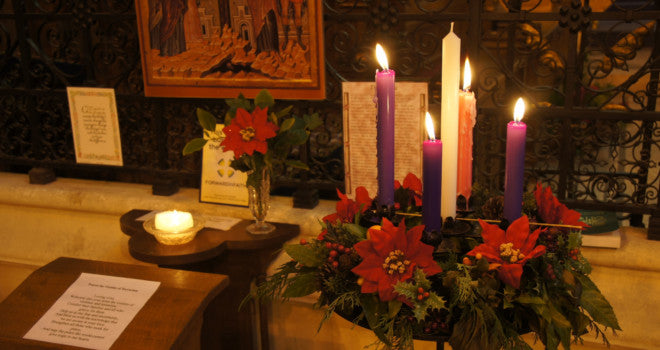
Advent: A Season of Hope and Expectation
|
|
Time to read 5 min
|
|
Time to read 5 min
Advent, the liturgical season preceding Christmas, is a time of expectant waiting and preparation for the celebration of Jesus Christ's birth. It is a period of spiritual renewal and a time to turn our hearts towards God. Advent offers a unique opportunity to deepen our faith and prepare to welcome the Messiah into our lives.
The word "Advent" comes from the Latin word "adventus," meaning "coming" or "arrival." The season anticipates the first coming of Christ at Christmas and His second coming at the end of time. It is a time of both remembrance and expectation.
Advent has a twofold character:
One of the most visible symbols of Advent is the Advent wreath. It is a circular wreath adorned with four candles. The three purple candles represent the weeks of penance and preparation, while the pink candle, often lit on the third Sunday of Advent, symbolizes the joy of the season. The wreath is a powerful reminder of the coming of Christ, as the lighting of each candle marks the passage of time until Christmas.
Many Catholics engage in Advent devotions to deepen their prayer life and prepare for Christmas. These devotions can include:
In addition to formal devotions, there are many simple ways to embrace the spirit of Advent:
Advent is a beautiful opportunity to create family traditions. Decorating the Advent wreath together, attending Mass as a family, and engaging in Advent-themed activities can strengthen family bonds and deepen the faith of each member.
By embracing the spirit of Advent as a family, parents can instill in their children a love for the Christmas season and a deeper appreciation for the meaning of Christ's birth.
Advent is more than just a countdown to Christmas; it is a profound spiritual journey. As we prepare to celebrate the birth of Jesus Christ, we are invited to examine our hearts and deepen our relationship with God.
The four Sundays of Advent are traditionally associated with the themes of hope, peace, joy, and love. These themes offer a roadmap for our spiritual journey during this season.
Advent is a beautiful opportunity to create lasting family traditions. Here are some ideas:
Advent is also a time for personal reflection and renewal. Consider incorporating these practices into your Advent journey:
By embracing the spirit of Advent, we open ourselves to the transformative power of God's grace. It is a time to encounter Christ anew and to live out our faith with renewed vigor.
Advent, as we know it today, has its roots in the early Church. While its exact origins are somewhat obscure, it is believed to have emerged in the 4th or 5th century as a period of preparation for the celebration of Christmas.
Initially, Advent was a time of penitence and fasting, similar to the season of Lent. This emphasis on preparation and renewal reflects the Church's understanding of the Incarnation as a new creation.
Over time, the focus on the joyful anticipation of Christ's birth became more prominent. The Advent wreath, with its symbolism of light and darkness, emerged as a powerful expression of this hope.
Advent has evolved throughout the centuries, adapting to cultural and historical changes. While its core meaning remains constant, the specific practices and devotions associated with Advent have varied across different regions and time periods.
Advent is a sacred season that invites us to deepen our relationship with God and prepare our hearts for the celebration of Christmas. It is a time of reflection, renewal, and anticipation. By embracing the Advent spirit through prayer, service, and community, we can experience the fullness of this special season.
Advent is not merely a countdown to Christmas; it is a journey towards encountering Christ anew. As we journey through the Advent season, may we be filled with hope, peace, joy, and love, preparing our hearts for the coming of the Savior.